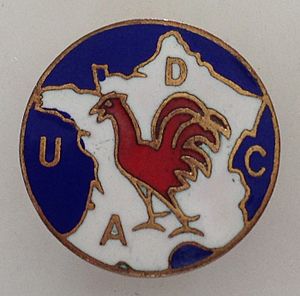Pierre Poujade facts for kids
Quick facts for kids
Pierre Poujade
|
|
|---|---|
| Born | 1 December 1920 Saint-Céré, France
|
| Died | 27 August 2003 (aged 82) La Bastide-l'Évêque, France
|
| Occupation | Politician |
| Spouse(s) | Yvette Seva |
| Children | 5 |
Pierre Poujade (born December 1, 1920 – died August 27, 2003) was a French politician. He was known for starting a political movement called Poujadism. This movement was popular in France during the 1950s.
Contents
About Pierre Poujade
Pierre Poujade was born in a town called Saint-Céré in France. He went to a private Catholic school. When his father, who was an architect, passed away in 1928, Pierre had to leave school because his family could no longer afford it. He then started working as a manual laborer.
As a teenager, Poujade joined a political group. Later, from 1940 to 1942, he supported the government of Philippe Pétain. After German forces took over more of France, he joined the Free French Forces. These were French soldiers who fought against the Germans from outside France. He joined them in Algiers, a city in North Africa. There, he met his future wife, Yvette Seva. They had five children together.
What was Poujadism?
After World War II, Pierre Poujade owned a book and stationery store. In 1953, he became famous for leading a protest. He and about 20 other people stopped tax inspectors from checking a shopkeeper's income. This event started a big movement of shopkeepers protesting against taxes. It began in his local area and then spread across many parts of France.
In November 1953, Pierre Poujade created an organization called the Union de Défense des Commerçants et Artisans (UDCA). This means "Defense Union of Shopkeepers and Craftsmen." This group helped organize the tax protests. Soon, the movement became known as "Poujadism."
Poujadism was very strong in the last years of the Fourth French Republic. It focused on the problems and worries of small business owners. These owners felt that economic and social changes were making their lives harder. The main idea of Poujadism was to protect ordinary people against the powerful elite.
The movement protested against income tax and price controls. These controls were put in place by the government to stop prices from rising too fast. Poujadism also did not like big factories, cities growing too much, and American-style modernization. They felt these changes threatened the traditional way of life in rural France. Poujadism often said that the French government was "thieving and inhuman." The movement also supported the idea of French Algeria, meaning Algeria should remain part of France.
Poujade's Political Life
By 1955, the UDCA was a very powerful political movement. It had 400,000 members. The group encouraged its members to protest taxes. They also told people to take their money out of banks owned by the government. The movement even called for a new meeting of the Estates General. This was a historic assembly in France, and Poujade wanted it to help create a new political system. The UDCA also published its own newspaper called Fraternité Française.
In the 1956 elections, the UDCA won 52 seats in the French parliament. This was a big surprise, as experts thought they would only win a few seats. One of the youngest members of parliament elected with the UDCA was Jean-Marie Le Pen. He was the leader of the UDCA's youth group at the time. Pierre Poujade was against France giving up control of Algeria. He also opposed the idea of a European army.
After the Fifth Republic was created in 1958, with Charles de Gaulle as president, Poujade and his party became less important.
Later, in 1965, Poujade supported Jean Lecanuet for president. In the 1981 and 1988 presidential elections, he supported François Mitterrand. Then, in the 1995 election, he supported Jacques Chirac.
In 1984, Mitterrand appointed Pierre Poujade to the Conseil économique et social. This is an important advisory group in France. Poujade used this position to promote biofuels, which are fuels made from plants.
Pierre Poujade later said that he regretted helping Jean-Marie Le Pen become a politician. He stated in 2002 that he would have preferred to hurt himself than to have helped Le Pen become a deputy.
Poujade's Impact Today
Even though the UDCA group is not as strong now, some of the ideas from Poujadism still exist in French politics.
For example, in 1969, another tax protest movement started that was similar to Poujade's. Today, some political groups still have ideas like Poujadism. These include the National Front, which often talks about being against taxes. Other groups also encourage French shopkeepers to avoid paying certain taxes.
In France, the word Poujadisme is sometimes used in a negative way. It describes any idea that is against the "establishment" or strongly criticizes the current political system. This can happen even if the idea doesn't involve protesting taxes or being against intellectuals, which were key parts of the original Poujadism.
For instance, in the 1990s, a newspaper called Le Monde diplomatique was criticized using the term poujado-marxisme.
Some people have also compared other political figures and movements to Poujadism. For example, in 2010, a writer for The New York Times compared the American Tea Party movement to Poujadism. In 2016, another New York Times writer identified Donald Trump as a Poujadist. British historian Timothy Garton Ash also mentioned Poujade when discussing Brexit, the United Kingdom's decision to leave the European Union.
See also
 In Spanish: Pierre Poujade para niños
In Spanish: Pierre Poujade para niños
 | Victor J. Glover |
 | Yvonne Cagle |
 | Jeanette Epps |
 | Bernard A. Harris Jr. |


